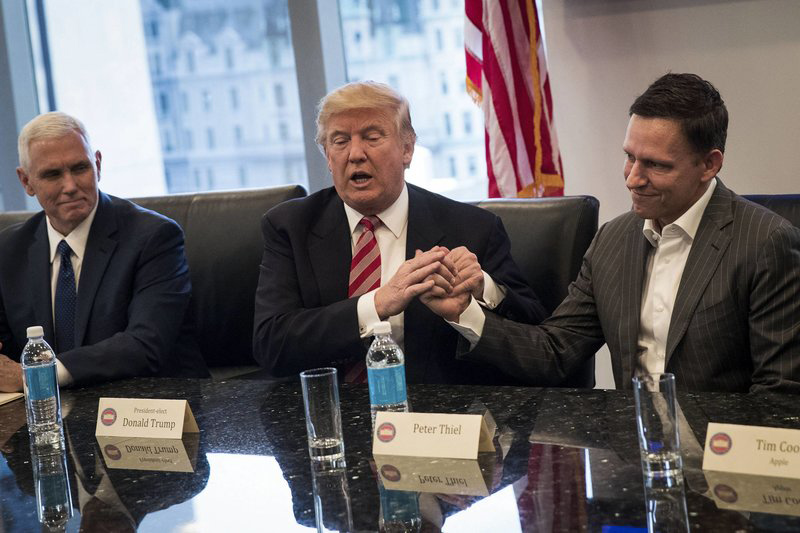特朗普提出5G計劃,彼得·泰爾獲益最大

|
美國的無線互聯網接入的前景未明——不過局勢很快就會塵埃落定。隨著特朗普上個月在競選連任活動上宣布了對于一家政府控制的5G網絡公司的支持,爭論變得更加激烈。 正如5G理念的推廣者所樣,開放、標準化的無線網絡接入有許多優勢。不過也存在一個大問題:該計劃會給特朗普當局選擇的公司帶來巨額收入,原因可能出人意料——專利費。 特朗普在競選中的提議本質上就是分配一段無線頻譜,也就是手機和其他無線設備通信的無線電頻率,供5G網絡設備開放接入。這些設備需要遵循一系列決定何時通訊的協同規則,以免彼此干擾——就像人們在擁擠的晚宴上聊天一樣。這種協同技術是Rivada Networks的業務核心。該公司由彼得·泰爾投資,是開放接入5G計劃的公開支持者。 開放接入5G是否是個明智的構想,這點存在爭議。的確,我的同事吉姆·貝克就撰文提出了一些關鍵的國家安全和實施問題。不過Rivada這樣的公司不僅有構想,它們還有與之對應的專利。 Rivada在“動態頻譜仲裁”(dynamic spectrum arbitrage)這項5G開放接入所需的協同技術上擁有至少40項全球專利。公司表示其“全面的”專利“全方位”涵蓋了“動態無線網絡共享”。這些專利讓Rivada有了政府支持的獨到優勢,可以向任何使用公司開放接入技術的用戶收費,或阻止他們使用,還可以起訴那些拒絕付費的用戶。 一方面,Rivada持有的這類技術在市場上取得了成功,讓公司通過競爭獲取了專利回報。不過,通過游說特朗普當局將其作為國家標準,Rivada將會獲益更多。每部手機、平板電腦或其他無線設備都會被要求按照規定遵守開放接入標準,也就是使用Rivada的專利。如此一來,這家公司就能從規模高達3.9萬億美元的移動技術和服務市場中獲取幾乎每一家公司的專利費用。更糟的是,它還能通過戰略性的專利訴訟來選擇市場競爭的勝者和敗者。 一家扮演5G守門人角色的專利所有者無益于競爭市場或創新市場,盡管那些必須贊美守門人的公司之間存在著表面的競爭。聯邦貿易委員會(Federal Trade Commission)對高通(Qualcomm)的訴訟和近來國際貿易委員會(International Trade Commission)發布的決定已經證明由壟斷性專利許可方主導的技術市場既低效又錯綜復雜。而這些爭端涉及的只是自行研制的私有標準。很容易想到,一項由聯邦強制執行的標準會在經濟上造成更加嚴重的影響。 我們幾乎沒有理由相信政府可以在強制推行全國統一的5G標準的同時避免陷入專利泥潭。特哈斯·納雷查尼亞在2015年的一篇論文中詳細闡述了政府在公共衛生或安全領域的目標與專利之間多次發生沖突的情況。專利勝出的次數遠遠多于政府。 Rivada這樣的公司像專利的操偶師一般控制著5G標準,凸顯了一個籠罩在美國經濟之上的更大隱患。過去幾十年里,專利所有者通過游說國會、法院、白宮,成功提高了專利的勢力與強度。申請和使用專利變得更加簡單,專利在訴訟中也更具價值。 對于在車庫實驗室中需要法律幫助的弱小創新者而言,強大的專利權可能很有誘惑力。但現在的創新已不復重前。如今,專利是與核心技術、廣泛行業和政府規定交織在一起的復雜工具。在這樣的新環境下,看似無傷大雅的政策理念,例如開放無線網絡接入,可能會因為對反競爭專利的威脅而引發巨大影響。(財富中文網) 作者查爾斯·杜安是位于華盛頓特區的非營利、無黨派智庫R Street Institute的技術與創新政策主管。 譯者:嚴匡正 |
The future of wireless Internet access in America is unclear—but it will be decided soon. The debate grew more serious last month, when the Trump re-election campaign announced its support for a government-controlled 5G network. There are many things to like about the idea of open, standardized access to the wireless airwaves, as promoters of the idea have argued. But there’s also a major problem: The plan would be a massive payout to a company hand-selected by the Trump administration, for a perhaps unexpected reason—patents. The Trump campaign proposal would essentially allocate a range of wireless spectrum, the radio frequencies by which mobile phones and all other wireless devices communicate, for open access to fifth-generation (5G) network devices. Those devices would need to follow a set of coordination rules for determining when to communicate, lest they end up interfering with each other—like people who talk over each other at a crowded dinner party. That coordination technology is at the heart of the business of Rivada Networks, the Peter Thiel-backed company that has been an outspoken supporter of the open-access 5G plan. There is debate over whether open-access 5G is a good idea; indeed, my colleague Jim Baker has written about some key national security and implementation issues. But companies like Rivada don’t just have ideas. They have patents on those ideas. Rivada has a sizable worldwide portfolio of at least 40 patents on “dynamic spectrum arbitrage,” the coordination technology needed for 5G open access. The company has described its patents as “sweeping” and covering the “full range” of “dynamic wireless network sharing.” Those patents give Rivada a government-backed privilege to demand payments from—or even stop—anyone using the company’s open-access technology, and to sue those who refuse. It would be one thing if technology like Rivada’s were successful in the market and the company reaped the rewards of its patents through competition. But by lobbying the Trump administration to adopt a national standard, Rivada stands to earn far more. Every phone, tablet, or other wireless device would be required by fiat to comply with open-access standards—and thus to use Rivada’s patents. That one company would be able to extract payments from potentially every player in the $3.9 trillion mobile technologies and services market. Even worse, it could choose winners and losers in that market through strategic patent litigation. A patent owner playing gatekeeper to 5G does not make for a competitive or innovative market, despite the superficial appearance of competition among those who must pay tribute to the gatekeeper. The Federal Trade Commission’s lawsuit against Qualcomm and recent decisions issued by the International Trade Commission attest to the inefficiencies and convolutions of technology markets dominated by monopolistic patent licensors. Those disputes involved voluntary, private standards; it is easy to imagine how a federally mandated standard could be far worse economically. There is little reason to believe that the government could sidestep a patent morass were it to impose a national 5G standard. A 2015 paper by Tejas Narechania details the many times that patents have come into conflict with government objectives like public health or safety. Far too often, the patents win. That a company like Rivada could play patent puppeteer over a national 5G standard illustrates a larger problem looming over the U.S. economy. Over the last few decades, patent owners have successfully lobbied Congress, the courts, and the White House to increase the power and strength of patents, making them easier to get, easier to use, and more valuable in lawsuits. For a small inventor in a garage lab who needs all the help the law can give, powerful patent rights can be attractive. But that is not innovation today. Now, patents are complex instruments intertwined with key technologies, ubiquitous industries, and government regulations. In this new environment, a seemingly innocuous policy idea, like open access to wireless networks, could have dramatic consequences because of the threat of an anticompetitive patent. Charles Duan is the director of technology and innovation policy at the R Street Institute, a nonprofit, nonpartisan think tank based in Washington, D.C. |













